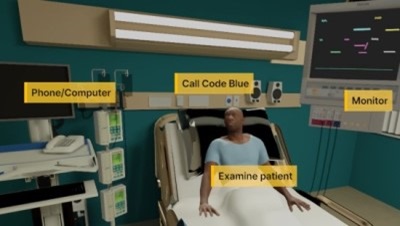In-situ, Inter-professional Simulation to Improve the Response to Rapidly Deteriorating Patients
$125,000 Award
Project Overview
Very high-acuity patients are at risk for deterioration, but delays in recognition, poorly coordinated responses, and ineffective communication may lead to further deterioration and cardiac arrest, as well as stress in team members. The goal of this project is to utilize a novel combination of a game-based application and full-scale, high-fidelity simulation training to improve the inter-professional bedside teams’ identification of subtle changes in patients’ conditions, critical thinking to improve the response to deteriorating patients, and collaboration with the Rapid Response Team. The anticipated outcomes would be decreases in the number of ICU transfers and cardiac arrests plus a decrease in burnout and improvement in work satisfaction among Rapid Response Team and floor team members.
Project Team
- Samuel A. Tisherman, MD, FACS, Surgery
- Nicholas Morris, MD, Neurology
- Maureen Archibald, MS, RN, Clinical Practice and Professional Development
- Sai Ho Jason Chui, PharmD, BCPS, Pharmacy
- Mojdeh Heavner, PharmD, BCPS, Pharmacy Practice and Science
- Benjamin Neustein, MAT, Paramedic, Critical Care and Trauma Education
- Robin Price MSN, RN, Clinical Practice and Professional Development
- Kathleen To, MD, FACS, Surgery
- Shawn Craft, RRT, Respiratory
June 2022 Updates
We have created the gaming app with Grendel Games and set up a survey for the Maslach Burnout Inventory (MBI). For the in-situ simulation, we have the equipment we need and have developed the scenario.
Our plan is to begin the roll out of the MBI and the gaming app in July.
Project Outcomes

The team successfully developed an innovative game called “Distress!”. The game, in conjunction with a mannequin, simulates responses to coding patients.
The team trained several units on the use of the game and response, leading to improved patient care outcomes. Of the trained clinicians, many commented that they now feel more comfortable calling for help and escalating early, communicating more clearly, and questioning requests from providers. Overall, they conveyed confidence in responding to these situations as a result of the "Distress!" game.
The game can be downloaded and played by anyone, found in mobile App stores as "Distress!", as well as by following this link: https://distressthegame.com/game
Awards
In September 2023, the team was awarded a gold medal from the International Serious Play Awards for their impressive app, "Distress!". International Serious Play Awards recognize and honor outstanding learning products which incorporate game elements and were created for use in education or training. This team's novel method of bridging the gap between didactic and in-situ simulation learning earned them this award. With over 192 participants to date, this gamified simulation has sharpened the communication and deterioration identification skills of many clinicians while increasing their comfortability with calling for help and escalating early. Congratulations on this achievement and many thanks for promoting patient safety and improved health outcomes through this innovation.
